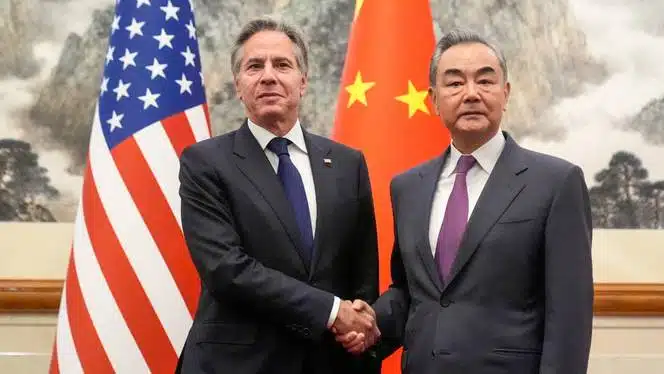Chinese Foreign Minister Wang Yi claims that bad aspects of relations between the two countries “are still increasing and building” while hosting a top US official who is anticipated to bring up issues pertaining to trade, Taiwan, and Russia.
As negotiations got underway in Beijing, China pressed US Secretary of State Antony Blinken to resolve growing differences between the two countries or risk a “downward spiral”.
On Friday, Blinken made his second visit to the adversary nation in less than a year and expressed optimism for improvement while announcing that he would bring up specific areas of disagreement, which are probably going to be trade, Taiwan, and Russia.
After leaders Xi Jinping and Joe Biden met at a summit in November, Chinese Foreign Minister Wang Yi told Blinken that ties between the two biggest economies in the world were “beginning to stabilise” as they were being received at the Diaoyutai state guesthouse in the capital’s historic gardens.
“But at the same time, the negative factors in the relationship are still increasing and building,” Wang stated.
“There are numerous disturbances in the relationship. China’s fundamental interests are being jeopardized, and its lawful development rights have been disproportionately curtailed,” he declared.
“Should China and the United States keep in the right direction of moving forward with stability, or return to a downward spiral?”
“This is a major question before our two countries and tests our sincerity and ability.”
a wish for advancement
Prior to his arrival, Blinken’s advisors declared that he would tackle several issues, such as China’s backing of Russia, which has quickly reconstructed its military facility just two years after invading Ukraine.
Blinken stated he would be “very clear, very direct” when he began the discussion with Wang, but he also remarked, “I hope we make some progress on the issues our presidents agreed” on.
As “clear as possible about the areas where we have differences — at the very least to avoid misunderstandings, to avoid miscalculations,” Blinken suggested that the two nations communicate with each other.
“That really is a shared responsibility that we have not only for our own people, but for people around the world.”
In recent years, Beijing and Washington have clashed over hot-button issues ranging from trade and technology to human rights, Taiwan, and the South China Sea dispute.
Since Presidents Biden and Xi convened in San Francisco in November for discussions that both parties deemed to be a qualified success, relations have somewhat stabilized.
During their subsequent phone conversation this month, the two disagreed over US trade restrictions on technology and Taiwan, which Beijing stated it would not rule out using force to annex.






